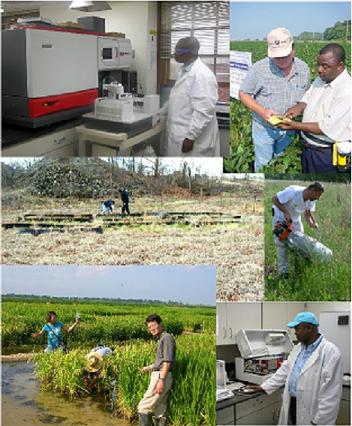Environmental Science
Environmental Research Program at Lincoln University
 The mission of the environmental research program at LU is to address current environmental problems facing Missouri residents as well as the nation through cutting-edge research that would lead to sustainable solutions to the problems and improving quality of life. Research focus areas are: climate change, renewable energy, environmental contamination/characterization, risk assessment/management, water quality, watershed management, remedial technology, and nanotechnology. The program is funded through grants by various federal and state agencies such as USDA, NSF, EPA, DOD, EPA, NASA, MODNR, etc. and supported by excellent research facilities and laboratories that are equipped with state-of-the-art instruments and up-to-date software to meet research needs. Specific research emphasis are as follows:
The mission of the environmental research program at LU is to address current environmental problems facing Missouri residents as well as the nation through cutting-edge research that would lead to sustainable solutions to the problems and improving quality of life. Research focus areas are: climate change, renewable energy, environmental contamination/characterization, risk assessment/management, water quality, watershed management, remedial technology, and nanotechnology. The program is funded through grants by various federal and state agencies such as USDA, NSF, EPA, DOD, EPA, NASA, MODNR, etc. and supported by excellent research facilities and laboratories that are equipped with state-of-the-art instruments and up-to-date software to meet research needs. Specific research emphasis are as follows:
Site Risk Assessment and Remediation
This research is to assess inorganic and organic pollution in soil resulting from mining, army or agriculture operations and develop site-specific remediation technology to reduce the human health and ecological risks and restore the impaired environment.
Water Quality and Watershed Management
The research explores the use of chemical spectroscopy and molecular biotechnology to characterize dissolved organic carbon/nitrogen, pesticide, and water-borne pathogens in surface water bodies and develop source tracking and treatment technology or watershed management practices for control of the pollutants in drinking water and quality protection of water supply.
Climate Changes
This research is to assess greenhouse gas emission in various ecosystems, in an effort to develop best management practices strategy for enhancing carbon sequestration in soils.
Renewable Energy Technology
This research is to develop optimal systems for maximizing algae growth and biomass production using CO2 produced from Missouri power plants and identify algea species for biofuel extraction, as well as energy production technology using agriculture wastes.
Nanotechnology
Optical and biosensors are designed for detecting E. Coli or metals through nano- or bio-technology approach. The sensors can be potentially applied for environmental monitoring, food security, health and risk assessment.
107 Foster Hall
Jefferson City, MO 65101
Telephone: (573) 681-5380
Fax: (573) 681-5955
Email: YangJ@LincolnU.edu

